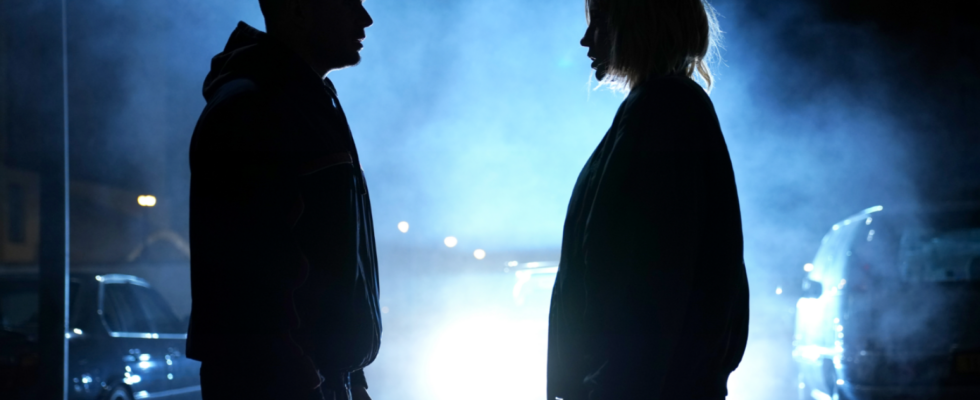Studiocanal
François Civil and Adèle Exarchopoulos in “L’Amour ouf” by Gilles Lellouche.
CINEMA – 457. This is the number of words that François Civil – or rather his character, Clotaire – found in the Larousse dictionary to describe the chosen one of his heart, played by French cinema star Adèle Exarchopoulos, in the film Love phewpresented in competition at the Cannes Film Festival this Thursday, May 23.
“ Remember when you told me I didn’t have enough vocabulary to express myself? », we hear him ask, while a doctor is sewing up the skull of the latter, called Jackie (short for Jacqueline) in Gilles Lellouche’s fourth feature film, as director.
Love phew tells the incredible story of a love story, firstly that of two teenagers (played by Mallory Wanecque and Malik Frikah) who are separated in the 1980s. Don’t be fooled by the big eyes of Clotaire’s Puss in Boots. A young delinquent, he dropped out of school and spends too much time outside, when it’s not to beat up others. Jackie comes from a wealthy background, has a very loving father (Alain Chabat) and good grades at school.
It wasn’t love at first sight between them. It all starts when, getting off the bus, he taunts her about her looks. She answers him, stands her ground. He likes it and will do everything to charm her. It works. Their touching story takes off. They are completely high until the day Clotaire plunges into organized crime. The twelve years in prison he received for a crime he did not commit sign the couple’s death warrant.
Ten years later, he was released. She, married. Far from the turbulence of her adolescence, Jackie now has a tidy little life. But unsurprisingly, she’s not happy. It either. It’s certain: they still love each other.
A “phew” love to watch
Said like that, the scenario is not very original. And yet, their love story is “wow” to watch, particularly through its catchy staging, tinged with humor, and made up of collective dance scenes like La La Land in the north of France or postcard landscapes, mixing the port docks with eclipses and sunsets on the beach. The rock’n’roll soundtrack (composed among others of the Cure), the fiery end credits and the gruff dialogues also have something to do with it.
On the other hand, don’t expect to dream in front of this love story. Surrounded by violence, blood, broken windows, tears or fear, it really doesn’t make you want to experience it. Jacqueline and Clotaire have become dependent on each other and find nothing or no one else a potential new source of happiness.
“ We will never have better », he confides to her one lunchtime at the restaurant, between two mouthfuls of spring rolls. “ That ? » asks the young woman. “ That we », breathes Clotaire. After all, who are we to judge? Their story is certainly not a fairy tale, but it can be found in theaters on October 16.
Also see on HuffPost :

